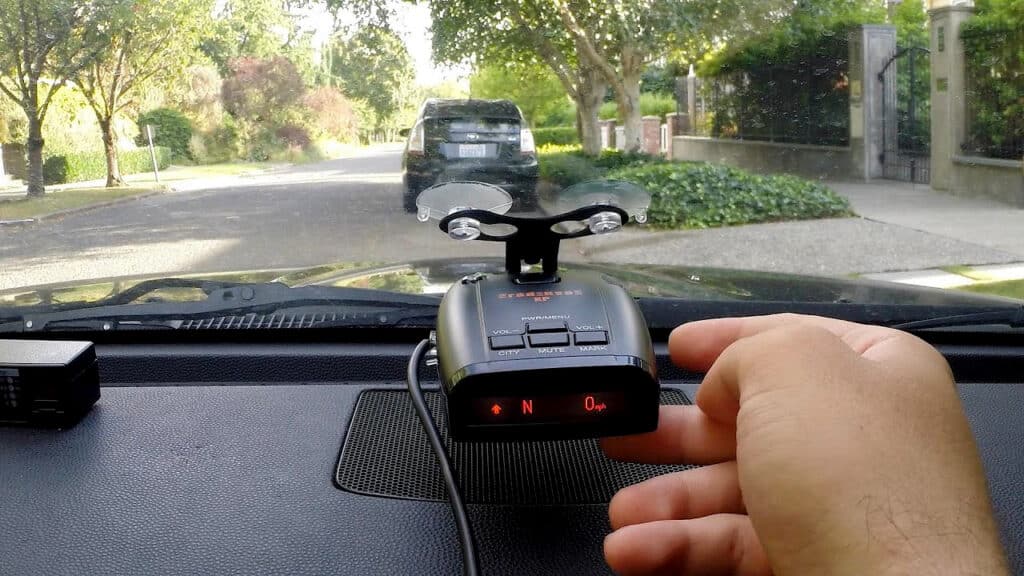Radar detectors are neat little devices that alert you when there’s a police speed radar around, but for obvious reasons, using them is not always encouraged.
Regardless of the moral implications of using one, they are in fact legal to use in many U.S. states.
So if you’re wondering, “are radar detectors legal in Nebraska?” you’ve come to the right place. In this article, we’ll discuss everything you need to know about the legality of radar detectors in your state.
Relevant Restrictions

Every U.S. state imposes different limitations and regulations when it comes to using radar detectors.
It’s always a good idea to check what the law in your state says about devices like these. In Nebraska, radar detectors are legal, but laser jammers are not.
Windshield Mounting
Unless you are in the state of Minnesota or California, you can mount a radar detector on your vehicle’s windshield. In those two states, there are laws that restrict the use of any device mounted on the windshield that might obscure the driver’s vision.
Needless to say, this applies to radar detectors. Typically, law enforcement officers don’t mind the presence of a radar detector on the windshield as long as you are in a passenger motor vehicle and it is legal in the state.
If you are traveling outside Nebraska, it is wise to check the relevant laws in each state that you will be driving to.
Privately Owned vs Commercially Owned Vehicles

In states like Nebraska, where it is legal to use radar detectors, it’s best to assume that the legality applies only to passenger vehicles. While the laws are slightly different for commercial vehicles depending on the state, most of them are not allowed to have radar detectors.
There are federal laws that prevent commercial vehicles above 10,000 lbs to have radar detectors attached to them when they are being driven. That number changes in some states, but it only gets higher.
So, the best way to stay out of trouble if you are driving a commercial vehicle is to not have a radar detector. This will help you avoid risks like getting pulled over or getting your license suspended.
Driving in a Military Area
Now, you should expect traffic rules to be different when you are in a military area because the security precautions in these places are typically more stringent. And, you guessed it, you are not allowed to use radar detectors in military areas.
Federal laws have been put in place that prohibit you from entering a military area with a visibly mounted radar vehicle. This will be checked at the entrance, where the military area usually has a checkpoint.
If you violate this law, you may be ticketed, fined or arrested.
Radar Detector vs Radar Jammer
A radar detector essentially detects the presence of a police radar that is used by officers to measure your vehicle’s speed. Having a radar detector can help you avoid speeding tickets if you’ve accidentally gone past one.
A radar jammer, on the other hand, does exactly what the name says. It jams any other radar signals that are being emitted in its vicinity. They are often used by individuals to disrupt the radar guns that law enforcement officers have, and that’s illegal.
Can The Police Detect My Radar Detector
Police officers go through extensive training so they know exactly what to look for. They understand how this technology works, and are well-equipped with information on how to detect it.
You should know that police officers utilize devices called radar detector-detectors, or RDD, which they use to detect your radar detector. So, yes, they could very well know if you’re using a radar detector.
State of Nebraska Info

Situated in the Great Plains of the Midwestern region of the U.S., Nebraska is the 3rd largest producer of corn in the country, which gives it its nickname, “The Cornhusker State.”
The name Nebraska is derived from the Native American words meaning “flat water”, which refers to the Platte River that runs through the state.
The state has wide open plains, towering dunes, dramatic rock formations and a lively city, all of which make the state a great place to visit.
Population: 1.96 million
Capital: Lincoln
Registered vehicles: 1,802,498
Total lane miles: 193,996
Number of highways: 5

